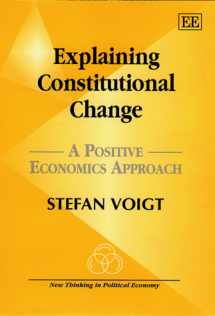
Explaining Constitutional Change: A Positive Economics Approach (New Thinking in Political Economy series)
ISBN-13:
9781840641691
ISBN-10:
184064169X
Author:
Stefan Voigt
Publication date:
1999
Publisher:
Edward Elgar Publishing
Format:
Hardcover
264 pages
FREE US shipping
Book details
ISBN-13:
9781840641691
ISBN-10:
184064169X
Author:
Stefan Voigt
Publication date:
1999
Publisher:
Edward Elgar Publishing
Format:
Hardcover
264 pages
Summary
Explaining Constitutional Change: A Positive Economics Approach (New Thinking in Political Economy series) (ISBN-13: 9781840641691 and ISBN-10: 184064169X), written by authors
Stefan Voigt, was published by Edward Elgar Publishing in 1999.
With an overall rating of 4.0 stars, it's a notable title among other
books. You can easily purchase or rent Explaining Constitutional Change: A Positive Economics Approach (New Thinking in Political Economy series) (Hardcover) from BooksRun,
along with many other new and used
books
and textbooks.
And, if you're looking to sell your copy, our current buyback offer is $0.3.
Description
This book aims to extend the current research and debate in constitutional economics by using a positive economics approach. Born out of discontent with the current state in constitutional economics, this book presents an inquiry in the possibilities of a positive constitutional economics, and how societies choose their constitutional rules. Drawing on economics, the book examines the emergence of constitutions and how and why they change over time. The author proposes that model constitutions are based on, and backed by institutions which have developed spontaneously. He presents some predictions on the scope of constitutional change under various constitutional settings and factors which cause constitutional change. Stefan Voigt concludes that constitutional change is reconceptualized as the outcome of a bargaining game, in which changes reflect the altered bargaining power of the actors. This book will be welcomed by academics working in the fields of political economy, law and economics as well as those from the public choice and new institutional schools of thought.


We would LOVE it if you could help us and other readers by reviewing the book
Book review

Congratulations! We have received your book review.
{user}
{createdAt}
by {truncated_author}


